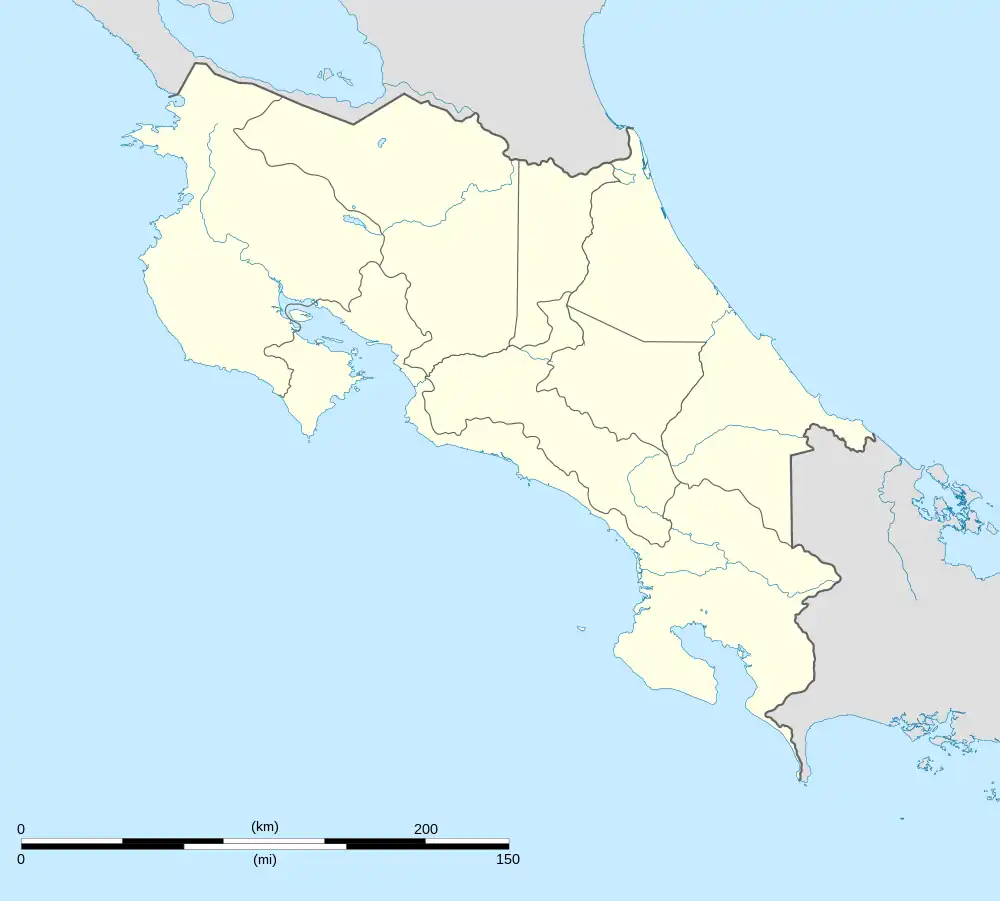Venado | |
|---|---|
Venado district | |
 Venado Venado district location in Costa Rica | |
| Coordinates: 10°33′56″N 84°46′21″W / 10.5654311°N 84.7725122°W | |
| Country | |
| Province | Alajuela |
| Canton | San Carlos |
| Creation | 14 April 1966 |
| Area | |
| • Total | 169.28 km2 (65.36 sq mi) |
| Elevation | 252 m (827 ft) |
| Population (2011) | |
| • Total | 1,754 |
| • Density | 10/km2 (27/sq mi) |
| Time zone | UTC−06:00 |
| Postal code | 21010 |
Venado is a district of the San Carlos canton, in the Alajuela province of Costa Rica.[1][2]
History
Venado was created on 14 April 1966 by Decreto Ejecutivo 18. Segregated from Grecia canton.[2]
Geography
Venado has an area of 169.28 km2[3] which makes it the seventh district of the canton by area and an elevation of 252 metres.[1]
Located three kilometers from the head of the district, there are caverns, which are 2000 meters long and are integrated by galleries, rooms, bathrooms, tunnels, windows, vents and chimneys.
In addition to the caves, there are rivers, forests and waterfalls.
It limits the northeast with the districts of Monterrey, the southeast with La Fortuna, the west and southwest with Tilarán and the northwest with the canton of Guatuso.
The direct connection that is offered by bus from the place is to Quesada.
Demographics
| Historical population | |||
|---|---|---|---|
| Census | Pop. | %± | |
| 1973 | 3,712 | — | |
| 1984 | 1,793 | −51.7% | |
| 2000 | 1,705 | −4.9% | |
| 2011 | 1,754 | 2.9% | |
|
Instituto Nacional de Estadística y Censos[4] |
|||
For the 2011 census, Venado had a population of 1,754 inhabitants.[6]
Transportation
Road transportation
The district is covered by the following road routes:
Settlements
The 14 population centers of the district are:
- La Tigra
- Jicarito
- Santa Martha
- Santa Lucía
- Linda Vista
- El Cacao
- San Isidro
- Cantanuario
- El Burío
- Sangregado
- La Esperanza
- Venado
- Santa Eulalia
- Puerto Seco
Economy
The main productive activity is the cattle raising of milk and meat and its derivatives (like the manufacture of cheeses) together with the production of roots and tubers.
References
- 1 2 "Declara oficial para efectos administrativos, la aprobación de la División Territorial Administrativa de la República N°41548-MGP". Sistema Costarricense de Información Jurídica (in Spanish). 19 March 2019. Retrieved 26 September 2020.
- 1 2 División Territorial Administrativa de la República de Costa Rica (PDF) (in Spanish). Editorial Digital de la Imprenta Nacional. 8 March 2017. ISBN 978-9977-58-477-5.
- ↑ "Área en kilómetros cuadrados, según provincia, cantón y distrito administrativo". Instituto Nacional de Estadística y Censos (in Spanish). Retrieved 26 September 2020.
- ↑ "Instituto Nacional de Estadística y Censos" (in Spanish).
- ↑ "Sistema de Consulta de a Bases de Datos Estadísticas". Centro Centroamericano de Población (in Spanish).
- ↑ "Censo. 2011. Población total por zona y sexo, según provincia, cantón y distrito". Instituto Nacional de Estadística y Censos (in Spanish). Retrieved 26 September 2020.